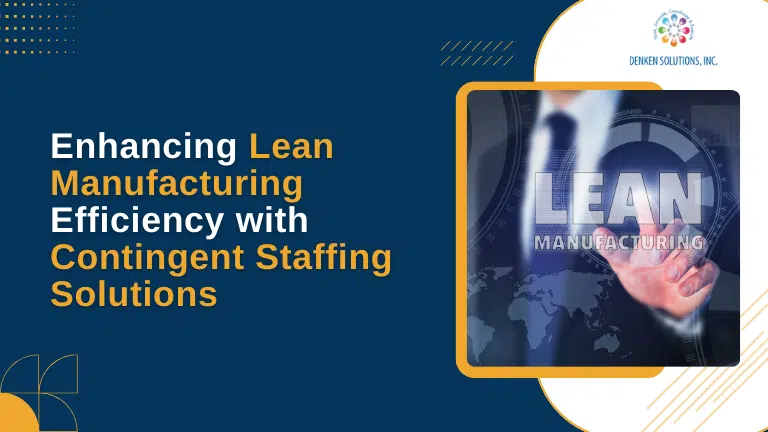The philosophy of lean manufacturing has its roots in the Toyota Production System, aimed at the complete elimination of waste in the manufacturing process using the best possible efficient strategies and methods without affecting quality and productivity. In the current competitive scenario, this distinctive yet strategic approach is increasingly adopted by manufacturing organizations to maximize efficiency while adhering to the sustainability goal of waste elimination. The supply chain disruptions caused during the COVID-19 pandemic were mostly felt in the manufacturing industry, causing organizations to cut costs and reduce resources while achieving maximum productivity and better sustainability.
However, implementing and sustaining lean manufacturing demands more than just advanced tools and technologies. It calls for the need for a skilled, talented, and flexible workforce. Contingent staffing for manufacturing proves to be a strategic imperative for businesses as it not only helps in meeting the needs of lean manufacturing but also fulfills the ever-evolving market requirements in terms of agility, scalability, and flexibility.
In this article, we will discuss the challenges that manufacturers face while following lean manufacturing and how contingent staffing for manufacturing can help mitigate these challenges.
Before that, let’s understand what lean manufacturing is.
What is the philosophy behind lean manufacturing?
The philosophy behind lean manufacturing revolves around five principles – identifying product value for customers, value stream mapping for the entire product lifecycle, creating and ensuring a seamless product flow, establishing a pull-based production system, and seeking perfection through continuous improvement. Once the manufacturer identifies the value that his product can deliver to the target audience, the value stream of the product is mapped, encompassing every phase from inception to disposal. In order to ensure the smooth and flawless flow of the product throughout its lifecycle, it is necessary for manufacturers to eliminate blockages in the value stream resulting from increased turnaround or cycle times, delays in product launches or deliveries, etc.
Unlike traditional push-based manufacturing systems where the supplies are purchased and the products are manufactured prior to customer order, the lean manufacturing philosophy uses the pull-based system, pulling customers’ orders first and then prompting the manufacturing of the ordered product. This system is intended to reduce inventories, eliminate overproduction and underproduction, and enhance output. The final principle makes it necessary for manufacturers to bring perfection to the manufactured product through constant improvement and innovation.
The aforementioned principles suggest that lean manufacturing is primarily focused on eliminating waste, improving product lifecycle, and elevating productivity, and all of these are possible when organizations possess a skilled, flexible, and adaptable workforce alongside innovative tools and technologies. With contingent staffing for manufacturing, organizations can attain workforce agility, flexibility, and adaptability.
The intersection of lean manufacturing and contingent staffing solutions
Implementation of lean manufacturing comes with numerous challenges, especially when manufacturers lack the right skill set, tools, technologies, and strategies. The key challenges that manufacturers usually face while following lean manufacturing are:
- Shortage of labor to drive production during high demands
- Deficiency of skills and competencies in the existing workforce
- Increasing labor costs, making it difficult to achieve the right balance between quality and resources
- Lack of flexibility and adaptability in existing teams, causing resistance to change
- Supply chain disruptions resulting from vulnerabilities in the market
Related read: Utilizing the Benefits of Contingent Staffing to Maximize Business Potential
Amidst the rapid pace of change and innovation in the manufacturing landscape, organizations can address these challenges by opting for contingent staffing for manufacturing. Here’s how:
Closes skill gaps and brings in specialized skills for advanced lean manufacturing
With constant advancements and innovations in manufacturing technologies and processes, it becomes necessary for manufacturers to develop a workforce skilled and competent enough to embrace those advancements and innovations. If the desired skills and competencies are not present in the existing workforce, organizations can switch to contingent staffing for manufacturing, thereby closing the skill gaps within teams. In fact, by hiring contingent workers with niche expertise, manufacturers can efficiently get through advanced manufacturing practices and processes for maximized productivity and improved efficiency.
Forward-thinking organizations make it a point to engage contingent workers in manufacturing not only to bridge the skill or talent gaps but also to bring in an opportunity for existing, permanent employees to upskill themselves. They can get hands-on experience and mentorship from contingent workers, who usually come with a wide array of skills, knowledge, and experience from various industries.
Enhances supply chain resilience with flexibility
Considering the massive supply chain disruptions faced across all industries during the pandemic, organizations ought to develop a strong layer of resilience to overcome such disruptions. As stated earlier, eliminating blockages in the product life cycle to avoid delays in product launches and deliveries is a key goal of lean manufacturing. With contingent staffing for manufacturing, organizations can create a strategic layer of resilience that enables them to respond quickly and efficiently to the changing supply chain dynamics while eliminating blockages in the product lifecycle.
Suppose a food and beverage manufacturer encounters excessive delays in the supply of raw materials due to unforeseen climatic conditions or geopolitical issues. This further results in delays in production and delivery of products. The organization does not have enough hands to fasten the production or the advanced skills to switch to alternative production processes. In the face of such a situation, it can leverage contingent staffing for manufacturing not only to fill labor shortages but also to get access to unique skills and ideas for transforming production processes and strategies. By implementing alternative methods or strategies, the manufacturer can elevate operational efficiency, thereby staying resilient to supply chain disruptions.
Provides grounds for Just-in-Time labor strategies
To eliminate the use of excessive human and financial resources, lean manufacturing relies on Just-in-Time (JIT) production strategy, that is, manufacturing goods when in demand. Following such a strategy with full-time, permanent employees is not possible as they will require fixed salaries no matter if the work is less or more. The best way to deploy a workforce on demand and implement a JIT production strategy is contingent staffing for manufacturing. Besides providing access to niche expertise for lean manufacturing, contingent workers give the opportunity to manufacturers to adjust their workforce size according to real-time market needs, thus decreasing idle time and labor costs.
The JIT production strategy proves to be highly effective for the automotive industry as it helps in cutting off additional storage and labor costs while improving operational efficiency. For instance, during a sudden rise in demand due to a new product launch, manufacturers can quickly deploy contingent workers to suit the production demand. The automotive industry also witnesses cyclical demand with changing seasons. With better traction and stability, SUVs remain in high demand in winter or diverse terrain conditions, while the demand for smaller vehicles increases during summers. Contingent staffing for manufacturing allows automotive companies to keep pace with demand fluctuations, leveraging temporary workers whenever the production ramps up and releasing them once the production goals are met.
Helps align labor costs with quality needs in production
By deploying contingent workers in manufacturing, employers pay for labor only when they are needed. This helps in optimizing labor costs, keeping them lean and easy to predict. Besides enabling manufacturers to adopt a flexible and scalable workforce model, contingent staffing allows the careful selection and engagement of talented professionals with specialized skills and competencies who can help maintain, improve, and elevate production quality. By opting for proficient temporary workers, manufacturers can ensure seamless management of the production processes, minimizing errors and adhering to the required quality standards.
One of the best ways to achieve the right balance between costs and quality when it comes to contingent staffing for manufacturing is to collaborate with an expert staffing agency like Denken Solutions. The success of contingent staffing for manufacturing often depends upon the efficiency and effectiveness of the staffing partner. By utilizing a specialized staffing partner, manufacturers can:
- Connect with a pre-screened pool of skilled and talented contingent workers ready to take up competitive job roles.
- Optimize workforce-related costs without compromising the quality needs of production.
- Ensure better compliance with global labor laws and regulations.
- Enrich existing teams with diverse and versatile talents.
Conclusion
As the manufacturing industry continues to evolve, the role of temporary workers becomes pivotal for companies to improve operational efficiency and bring innovation through lean manufacturing. The key challenges that contingent staffing for manufacturing helps to address are widening skill gaps, labor shortages, high labor costs, lack of resilience to supply chain disruptions, and lack of flexibility and adaptability to market changes.
So, if you aim to stay ahead of the manufacturing industry trends, channel proper grounds for innovation, optimize operations, and elevate flexibility, adaptability, and resilience in existing teams, partner with Denken Solutions today!



